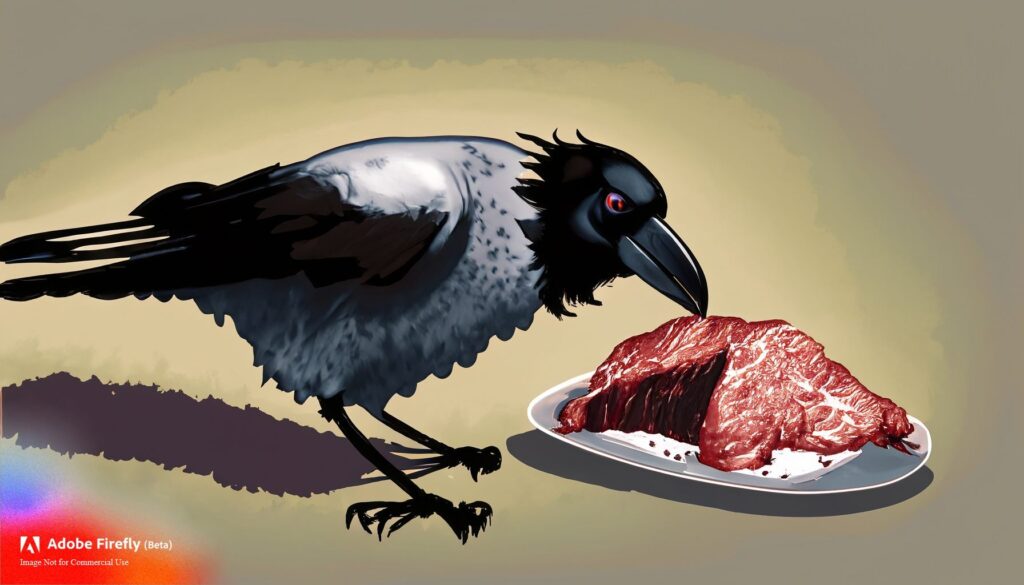
Exploring the culinary landscape, especially the non-vegetarian food, commonly leads us to unconventional choices. An unconventional and unpopular food choice that we are going to discuss today is Crow Meat.
Although it may sound new and alien to many, Crow Meat is a culinary offering. It surely has associations with mystery and intrigue, yet Crow Meat is enjoyed in some parts of the world. But Is Crow Good to Eat?
While some cultures have incorporated crow into their cuisine for generations, others remain cautious due to concerns about safety and environmental factors. Join us as we explore nutritional aspects, cultural perspectives, and potential health implications associated with consuming Crow Meat. The content may not blend with the food choices of many, but we are here to explore the unconventional side.
Can I Eat Crow Meat? Is Crow Meat Safe to Consume?
Absolutely, consuming crow meat is possible, but it comes with some important considerations. Historically, in certain cultures, crow meat has been utilized as a source of sustenance. But while consuming crow meat, safety is the primary concern due to the potential risks associated.
Crows are scavengers, birds who consume a diverse range of food items. From carrion insects to human waste and rotten meat, they eat a wide variety of items. However, their diverse and uncontrolled diet choices bring the chances of harmful bacteria or toxins present in their flesh. Due to this, the concern of safety while consuming Crow meat is often raised.
Besides that, environmental factors and pollution can also affect the safety of crow meat. Not only that, but cultural and ethical aspects play a role.
Since crows are intelligent sentient creatures, they hold cultural and symbolic significance in many regions. Therefore, there are many taboos regarding consuming their meat.
So overall, it is technically possible to eat Crow meat, but the safety and ethical considerations make it questionable. Whether or not Crow is good to it is a matter of debate, however, with fewer positive votes.
What Does Crow Meat Taste Like?
The taste of crow meat is slightly stronger than more common poultry like chicken. Crow meat is quite rich and earthy. The taste can also be compared to other wild game meats, including pheasant and ducks.
However, the taste of crow meat can vary depending on the crow’s diet, age, and preparation method. Generally, crow meat is known to have a gamy and intense flavor and, therefore, isn’t a choice for many palates. Because crows are omnivores and consume a wide range of foods, their meat might carry notes of what they’ve eaten.
How crow meat tastes also depends upon how it’s cooked and seasoned. Marinating the meat or using flavorful herbs and spices can help mitigate any potential strong or gamey taste.
However, due to concerns about safety, ethical considerations, and cultural perspectives, the experience of tasting crow meat is relatively rare and not widely discussed in culinary circles.

Is Eating Crow Meat as Common as Eating Other Meat?
Absolutely Not. Eating crow meat isn’t as common as eating chicken, goat, beef, or pork. Crow meat consumption is relatively rare and not a mainstream dietary choice. Some of the common reasons behind the same are:
- In many cultures, crows hold symbolic and sometimes sacred significance. Rather than consume, they are protected.
- Crows are often considered highly intelligent and sentient creatures. Due to this perception, this can lead to taboos and ethical concerns against eating them.
- There are potential safety concerns associated with consuming crow meat. Due to their potential exposure to toxins, Crow meat becomes less reliable and thus a probably unsafe food source.
- While there are instances of crow consumption in certain cultures, it’s not a widespread culinary tradition.
- Since crows are not raised for meat production like common livestock, sourcing crow meat is much more difficult.
In Which Part of the World is Crow Meat Common?
Crow meat consumption is not common on a global scale, and it’s generally considered unconventional in most parts of the world. However, there are a few regions where consuming crow meat has been practiced historically or is still a part of certain culinary traditions.
Some such common areas include:
- Parts of East Asia, including China and South Korea. Crow meat consumption is a historical practice here, yet it is not widespread.
- In some Pacific Island cultures, crow meat has been traditionally consumed as a source of food. However, crow meat is not common across all Pacific Island nations. It is more likely associated with some specific communities only.
- Some Native American tribes have historical records of consuming crow meat as part of their traditional diets.
Overall, there might be other localized instances of crow consumption in various cultures around the world, but they are not widespread or representative of global dietary practices.
Nutritional Composition of Crow Meat
Information about the nutritional composition of crow meat is limited and not widely available. This is because crow meat is not widely consumed, and therefore, there are very few comprehensive studies or data on its nutritional content.
The nutritional composition of crow meat can highly depend upon diet, age, and overall health of the individual crow. For instance, the meat of a domestic crow would be different, but that of wild crows can be leaner. Wild crow meat may have lower fat levels and can be an excellent protein source.
However, due to the lack of specific nutritional data for crow meat, it’s challenging to provide accurate information about its protein, fat, vitamin, and mineral content.
It is important to consult with experts in the field of nutrition and food safety while learning about Crow Meet.
Benefits of Consuming Crow Meat
Eating crow meat is unconventional and has its own set of potential benefits and risks. The risks are often more than the benefits.
- To adventurous eaters, trying unconventional meats like crow could provide a unique culinary experience.
- Consuming crow meat in cultures with historical traditions can have symbolic significance.
Risks of Consuming Crow Meat:
- Crows are scavengers, and thus, eating their meat raises safety concerns. There is a high chance that crow meat may contain harmful bacteria, parasites, and toxins. Consuming crow meat can lead to food-borne illnesses, which can range from mild discomfort to serious health issues.
- Crows are often considered intelligent and sentient creatures in many cultures, and thus, consuming their meat can be ethically incorrect.
- Eating crow meat may even raise animal welfare and conservation concerns.
- Crows play ecological roles as scavengers and predators, and thus, consuming their meat may have an environmental impact.
Before trying Crow meat, it is important to prioritize safety.
Where to Buy Crow Meat?
The sale of crow meat is not a common practice in most regions due to various factors. Cultural considerations, ethical concerns, and potential safety risks can bring concern to the buying and selling of crow meat.
As a result, finding crow meat for purchase can be extremely challenging, if not nearly impossible, in many places. If you are determined to explore the availability of crow meat, you might need to consider regions or cultures where crow consumption is more accepted or traditional.
However, be sensitive towards the local customs when approaching for crow meat. Also, practice thorough research about the legal regulations and ethical implications in your area. If all of that, verify the authenticity and safety of the product since consuming wild meat has its own set of risks.
How to Cook Crow Meat?
Cooking crow meat, while possible, is not a widely practiced culinary endeavor. Due to the rarity of consuming crow meat and the associated concerns, there are fewer recipes available around.
However, if you’re determined to try cooking crow meat, here are some general steps to consider.
- Make sure you are sourcing crow meat from a reliable and safe source. If you’ve hunted the crow yourself, make sure you are abiding by local hunting and wildlife regulations.
- Thoroughly clean the crow meat, removing feathers, skin, and any entrails. Make sure to handle the meat with care to avoid contamination.
- Given the potential strong or gamey flavor of crow meat, marination can help mellow out the taste. Use a mixture of lemon juice or vinegar along with herbs and spices to enhance the flavors.
- Try cooking methods such as roasting, grilling, or stewing. Make sure you cook crow meat for a long at a low temperature.
- Use strong flavors like garlic, onions, and herbs to add more complexity to the taste.
- Ensure that the meat is cooked thoroughly to a safe internal temperature to eliminate any potentially harmful bacteria or parasites.
Please Note: These guidelines are general and that cooking crow meat might not be advisable due to the potential risks associated with its consumption.
Wrapping up…
In conclusion, while crow meat can be consumed, safety, ethical, and cultural concerns, along with limited nutritional data, suggest that it’s not a recommended or common dietary choice.

Hi, There and Welcome to BirdsNews.com, is here to help you learn and care about pet birds. and this blog is a journal of everything I’ve learned.
